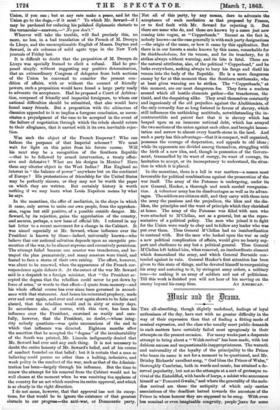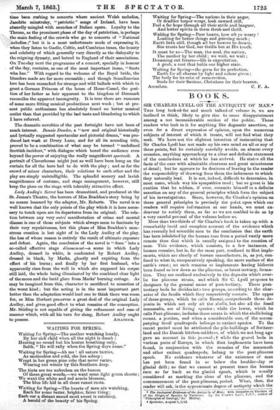Dusk au tt ranut.
THE all-absorbing, though slightly undefined, feelings of loyal enthusiasm of the day, have met with no greater difficulty in the way of their expression than that of finding a fitting mode of musical expression, and the class who usually meet public demands in such matters have certainly failed most egregiously in their attempts on the present occasion. For many weeks past a desperate attempt to bring about a " Welsh revival" has been made, with but dubious success and unquestionable inappropriateness. The warmth and universality of the loyalty of the principality to the Prince who bears its name is not for a moment to be questioned, and Mr. Brinley Richards' excellent song, " God bless the Prince of Wales," thoroughly Cambrian, both in words and music, has attained a de- served popularity, but not so the attempts at a sort of grotesque re- vival of the Eisteddfod, with bands of harps, a soloist who announces himself as " Pencerrd Gwalia," and where the generality of the melo- dies revived are those the antiquity of which only carries associations of the deadliest hatred towards the ancestors of the Prince in whose honour they are supposed to be sung. With even less nominal or even imaginable congruity, people have for some
time been rushing to concerts where ancient Welsh melodies, Jacobite minstrelsy, " patriotic " songs of Ireland, have been absurdly mingled with snatches of Italian opera. Loyalty to the Throne, as the prominent phase of the day of patriotism, is perhaps the main feeling of the crowds who go to concerts of " National melodies ;" but it is a most unfortunate mode of expressing it, when they listen to Gaelic, Celtic, and Cambrian tunes, the beauty and celebrity of which generally vary directly as the disloyalty to the reigning dynasty, and hatred to England of their associations. On Tuesday next the programme of a concert, specially in honour of the day, contains, as one of the most important items, " Scots wha hae." With regard to the welcome of the Royal bride, the blunders made are far more excusable ; and though Scandinavian lore has been ransacked for strange and wild ballads with which to greet a German Princess of the house of Hesse-Cassel, the posi- tion of her father as heir apparent to the kingdom of Denmark reconciles the apparent incongruity. It is true there are rumours of some more fitting musical productions next week ; but at pre- sent public enthusiasm has absolutely found no better musical outlet than that provided by the bad taste and blundering to which I have referred.
The dramatic novelties of the past fortnight have not been of much interest. Bonnie Dundee, a "new and original historically and lyrically suggested spectacular and pictorial drama," was pro- duced last week at Drury Lane, and for all its sounding title, proved to be a combination of what may be termed " undefined Scottish incident," with dialogue which bored the audience even beyond the power of enjoying the really magnificent spectacle. A portrait of Claverhouse might just as well have been hung on the curtain for all the hero had to do with the play ; and as for the crowd of minor characters, their relations to each other and the play are simply unintelligible. The splendid scenery and lavish magnificence of costume, and stage management, however, still keep the piece on the stage-with tolerably attractive effect.
Lady Audley's Secret has been dramatized, and produced at the St. James's Theatre, the horrors of Miss Braddon's story being by no means lessened by the adapter, Mr. Roberts. The novel is so well known that the only points of the play which it is here neces- sary to touch upon are its departures from its original. The rela- tion between any very outré manifestation of crime and mental disease is one of those subjects which always seem to fascinate by their very repulsiveness, but this phase of Miss Braddon's mon- strous creation is lost sight of in the Lady Audley of the play, the loss of whose reason is entirely the result of ultimate exposure and defeat. Again, the conclusion of the novel is " done " into a so-called effective stage denouement—a scene in which Lady Audley, dressed in white, is confronted by Robert Audley, dressed in black, by Marks, ghastly and expiring from the effect of his burns ; and finally by her first husband, who apparently rises from the well in which she supposed his corpse still laid, the whole being illuminated by the combined clear light of the moon and the lurid glare from Marks' burning cottage. As may be imagined from this, character is sacrificed to sensation of the worst kind ; but the acting is in the most important part better than the adaptation would lead one to think there was room for, as Miss Herbert preserves a great deal of the original Lady Audley, and gives good effect to what remains of the conception. Mr. Stirling is not capable of giving the refinement and ease of manner which, with all his turn for slang, Robert Audley ought



























































 Previous page
Previous page